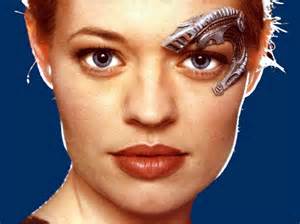
Star Trek’s ‘The Borg’ are a good metaphor for understanding some fundamental aspects of social relations under capitalism. This does not mean people are like drones, quite the reverse. Breakdowns in the metaphor occur because our limited existences created by the capitalist mode of production are distortions upon human nature rather than its total annulment. And people’s massive discomfort with this state of affairs means they seek liberation from the Borg Collective which doesn’t happen with the Trek drones unless they are temporarily disconnected from the Hive Mind. In reading this blog, you are temporarily disconnected from the Hive Mind (chiefly the opinion of authorities), and I will set out arguments through which you may come to achieve full humanity.
The Borg expand through assimilating humanoid life-forms in the galaxy and beyond, rather like the expansion of the world market gobbling everything up. In the assimilation process, your individuality is crushed and you are made to serve the Collective (society). The Borg are incredibly successful because they are efficient and constantly perfecting technology to further their programme of expanse. What the Borg fail to assimilate, they physically destroy. The Borg represent the ideal dream of how capitalism attempts to remould society, yet the ways in which the Borg are successful come at a terrible cost: the crushing of individuality and the end of the liberty of the individual.
In contrast, the humans in Star Trek are free, their internal conflicts are resolved usually through discussion rather than force. The Borg on the other hand suffer no internal conflict, they are already ‘as one.’ But how do the humans in Trek become free? Why do they volunteer to do things rather than nothing at all? Because labour has become life’s prime want.
Under capitalism, labour is coerced out of the individual, disguised as a ‘free exchange.’ Yet the worker quickly comes to understand the selling of their labour power was anything but free. They had nothing else to sell, nothing else to live from. In work, there is an obsession with ‘increasing productivity,’ work is experienced as uncreative doldrums, it is unrewarding, undertaken under tight supervision (including by CCTV), the products of labour are owned by someone else (the capitalist), there are poor bonds with other workers, and there is no rational set of ideas why we are all doing this in the first place. Work is reduced to the means to the end of survival in a dog-eat-dog world. It is not something desired by the individual, no-one goes to work looking forward to it and with a whistle in their heart.
Labour becomes life’s prime want by removing all these inhibitions to its unleashing. We shouldn’t have to ‘sell’ our capacity to work – means of production should be free to utilise by all. The obsession with being ‘productive’ needs to be cancelled out – how productive you are ought to depend on your own will. Rather than production seemingly for production’s own sake, the worker now chooses when and what to produce according to personal will, hence it becomes creative and rewarding, and there is no-one to take the product from you without your consent (e.g. as a part of consciously determined human relations). There is no supervision, except perhaps in an advisory capacity. The free worker now enjoys good quality bonds with his fellows, giving rise to coherent ideas why we do what we do.
With labour now as life’s prime want, capitalist society now looks shameful and embarrassing. It was Borg-like because it prioritised efficiency and productivity over individual liberty and choice. What’s worse the fake left-wing politicians of capitalist society must now feel incredibly embarrassed – all they did was to take capitalist slogans and suggest their programmes could do it better, as opposed to operating on the terrain of critique, thus developing a superior notion of human moral value.
Capitalism is Borg-like, but the individual worker even under this system is never quite like a drone. Rather in a society where all sides have accepted ‘there is no alternative to the Borg,’ the individual worker’s aspirations become expressed through religious or fetishistic forms. Thus 75% of Americans are still religious in the 21st century. 25% are also on some form of psychiatric medication or another. These aspects are not the main problem, they are symptoms of the problem, like flowers growing on the chains. They would be superseded with genuine humanised spirituality and a deeper sense of our social interconnections after we take action to remove the chains. By contrast, the Borg regarded in this way are a poor metaphor for the human condition under capitalism because they have no delusions. Ironically it seems it is the capacity to be delusional that is a big thing currently separating us from a race of advanced machines. It is better to be a human with delusions than a robot without them. Furthermore, unlike the Borg, we have strong interpersonal contacts such as a family life and enriching down-time. It is only when considered in the sphere of work which takes up most of our waking lives that the human condition under capitalism can be considered Borg-like. So, let’s widen the distinction between humanity and the Borg further in the interests of full liberation by changing the way we work. We shouldn’t have to live as a poor advertisement of ourselves.